Ptolemy I Soter (2)
Ptolemy I Soter (367-282): friend and biographer of the Macedonian conqueror Alexander the Great, after his death king of Egypt, founder of the the Ptolemaic dynasty, one of the Diadochi.
Rise to power
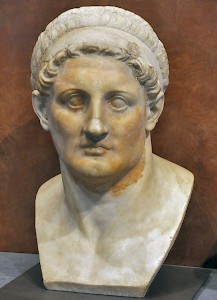
For the time being, Perdiccas' power was uncontested, and it was accepted as such by Olympias, the mother of Alexander. She offered the regent the hand of her daughter Cleopatra. This would make Perdiccas a member of the royal family and Alexander's brother-in-law. However, his very success caused his downfall. Several Macedonian officers (Antipater, Lysimachus, Antigonus Monophthalmus, and Craterus) united in Macedonia against Perdiccas, who now advanced with his army to the northwest. But the war was not to start in Anatolia.
In December 322, Perdiccas sent the remains of Alexander to the tomb that had been prepared in Macedonia's religious capital, Aegae. When it had arrived in Damascus, Ptolemy convinced the leader of the convoy that Alexander had wanted to be buried in the temple of his heavenly father Zeus-Ammon. Accordingly, the corpse was brought to Egypt, where it was to find its final resting place in Alexandria. This body-snatching was a provocation and Perdiccas was forced to organize a punitive action.
Ptolemy had already prepared for this. He had secured his rear by conquering Cyrenaica, which was from now on ruled by Ophellas. At the same time, Ptolemy himself gained control of parts of Cyprus.
In 321, the rebels cemented their alliance against Perdiccas by intermarriage. Antipater gave his daughters Phila and Eurydice to Craterus and Ptolemy (who appears to have sent away his Egyptian wife); Antipater's daughter Nicaea, who had once been promised to Perdiccas, married to Lysimachus of Thrace. Perdiccas saw that a formidable coalition was being organized. He decided to invade Egypt, and sent Eumenes (Alexander's former secretary and now the satrap of Cappadocia) against the armies of Antipater and Craterus. This was the beginning of the First Diadoch War. Eumenes defeated Createrus, who died in action.
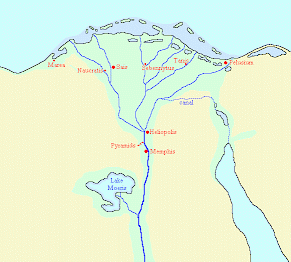
According to a Babylonian text known as the Diadochi Chronicle, it was May or June 320 when Perdiccas reached Egypt. Twice, he tried to cross the Nile near Pelusium, but Ptolemy was able to prevent this. Now, Perdiccas moved to the apex of the Delta, and retried the river crossing in the neighborhood of Heliopolis. However, his men were carried away by the waters. To all those present, it was obvious that Perdiccas could never conquer Egypt, and his soldiers, who already resented his harsh discipline, revolted. Perdiccas sought the advice of his colonels Peithon, Antigenes, and Seleucus. They, however, killed Perdiccas to put an end to the war.
Ptolemy and Perdiccas' officers started negotiations. Ptolemy was offered the regency, but refused to swallow the bait: he wanted to keep what he had won, not risk it in a larger gamble. He therefore appointed Peithon and an officer named Arridaeus, two people who were clearly lacking prestige and would never be able to stop separatists like Ptolemy.
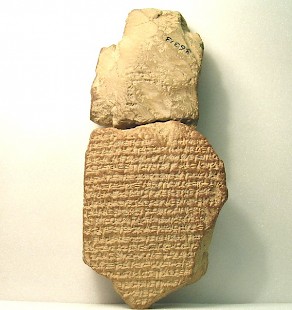
However, Antipater was not happy with this arrangement. He wanted to be the new regent, and may have been capable of reuniting Alexander's empire. At Triparadisus (perhaps at Baalbek), he settled the affairs in the way he wanted. The main points were (text):
- Antipater was the new regent and would keep an eye on queen-mother Roxane, king Philip Arridaeus and the young Alexander IV, who were to move to Macedonia.
- Perdiccas' murderer Seleucus was to become satrap of rich Babylonia;
- Antipater's ally Lysimachus kept Thrace;
- Antipater's other ally Antigonus the One-Eyed was reappointed as satrap of Pamphylia, Lycia and Phrygia, to which Lycaonia was added; he was to take over Perdiccas' army and had to expel Eumenes;
- Ptolemy was to remain satrap of Egypt.
Having settled all affairs, Antipater and the royal family went to Macedonia. It looked as if he was firmly in charge of the situation, but it was easy to see that Ptolemy had become independent and that Antigonus, as commander of the main army in Asia, was soon to become very powerful.
During the first years after the settlement at Triparadisus, Ptolemy had to do almost nothing to expand his power. In 319, Antipater died, and civil war broke out in the European part of the Macedonian army, where Antipater's son Cassander had been disinherited, and an officer named Polyperchon had become regent. Cassander asked and received help from Ptolemy, who also allied himself to Antigonus, who was still fighting against Eumenes - the only ally of Polyperchon. The war waged by Antigonus, Ptolemy, and Cassander against Eumenes and Polyperchon is called the Second Diadoch War (319-315).
The main campaign was fought by Antigonus, who defeated Eumenes near Gabae (Isfahan) and immediately demanded the submission of Seleucus, the ruler of Babylonia. Seleucus fled to Ptolemy. At the same time, Cassander expelled Polyperchon and killed king Philip Arridaeus and queen-mother Olympias. Ptolemy's only action was an attack along the Palestinian and Syrian coast in 317/316, which he occupied because all other commanders were looking somewhere else. To any Egyptian ruler, this was a normal thing to do: the pharaohs had already conquered these countries 1,000 years before, and the last kings of independent Egypt, Teos and Nectanebo II, had tried to do the same.
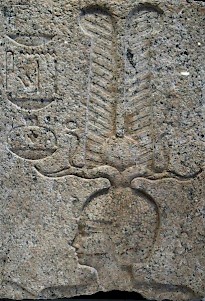
Another aspect of Ptolemy's reign can be seen in this light as well. Since the seventh century, the Egyptians had been focusing on the northwestern part of their kingdom, where Greeks and Carians had received trade concessions. Sais had become an important city, and Alexander had founded Alexandria in the same area. Ptolemy made it his capital. It was the culmination of a northwestern movement that had lasted for some time already.
Meanwhile, Antigonus had gained control of the east and was becoming very powerful. Seleucus must have warned Ptolemy, who in turn warned Cassander of Macedonia and Lysimachus of Thrace. In the first months of 314, they declared war against Antigonus: the Third Diadoch War.
Antigonus immediately seized the initiative. He invaded Ptolemy's part of Syria and secured Phoenicia with its naval resources. In the summer, Antigonus laid siege to Tyre, which was defended by soldiers of Ptolemy. They withstood their enemies for almost a year and three months, which offered Seleucus, who now served as Ptolemy's admiral, an opportunity to occupy Cyprus.
In the meantime, Ptolemy was gathering his forces. Although Tyre had fallen, he still had a large navy and decided to attack Cilicia, north of Cyprus. At Gaza, his army was intercepted by Antigonus' son Demetrius, who was unable to overcome the ruler of Egypt (autumn 312). Ptolemy proceeded to Syria, but when Antigonus arrived, he returned home, knowing that he was no match for the lord of Asia (winter 312/311). The Egyptian attempt to reconquer the Asian possessions had come to nothing.
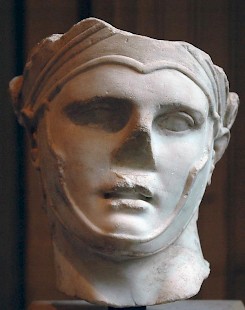
Yet, the campaign had not been without success, because after the battle of Gaza, Ptolemy's ally Seleucus had been able to return to his own satrapy, Babylonia. Here, he was recognized in 1 June 311. Although the consequences of this action were, at that time, unclear, Seleucus turned out to be Antigonus' nemesis.
By now, it had become clear that Antigonus could not defeat Ptolemy, Lysimachus, and Cassander. A peace treaty was concluded in December 311. The Third Diadoch War was over. Although Ptolemy and Antigonus did not agree on their border in Syria, they accepted an armistice. All parties recognized each other, and it was agreed that the boy king Alexander, son of Alexander the Great and Roxane, would become sole ruler of the entire empire when he came of age, in 305. The result of the treaty was, of course, that Roxane and the twelve year old Alexander were killed. This was the end of the Macedonian royal house (text). Another result was that Antigonus could concentrate his forces in Babylonia, where the Babylonian War started (311-308). However, Antigonus was unable to regain control of the eastern part of the Macedonian empire, where Seleucus became increasingly powerful.